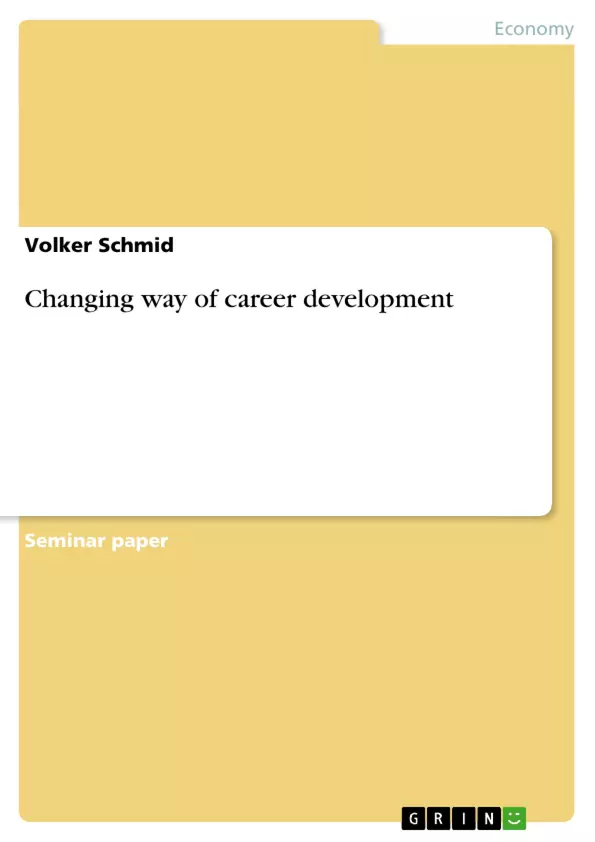Economic and business changes in the industrialised countries are radically altering the world of work (Barner, 1994). The way of career development has dramatically changed over the last decades (Kotler in Executive Female, 1995). The purpose of this paper is to discuss the changing organisational context for careers, the underlying permanent factor of adult development, and the impact this is having on career management and development. Key issues, theories and models by leading researchers such as Super, Levinson and Arthur are reviewed, shaping careers in the contemporary business environment. The final part includes the implications of the aforementioned for a career in Marketing.
Inhaltsverzeichnis (Table of Contents)
- Introduction
- Career definition
- The traditional career
- The changing organisational context and adult development
- Downsizing, evolution and decentralisation
- Outsourcing
- Increased global trading, multinationals and technology
- Adult development
- Theories of life development by Super, Levison and Erikson
- Career anchors by Schein
- Impact on career management and development
- Organisational and individual levels
- Organisational ownership replaced by self-employment
- Proactive personalities
- Changing career paths
- Career plateau
- Changing psychological contract
- Expert's advise
- Implications for a career in marketing
- Aims
- Initial situation
- Strengths and weaknesses
- Different entry possibilities
- Career opportunities in marketing
- Conclusion
- References
Zielsetzung und Themenschwerpunkte (Objectives and Key Themes)
This paper examines the evolving landscape of career development, highlighting the impact of changing organisational contexts on career management and development. The author explores the shift from traditional, linear career paths to more dynamic and flexible models, focusing on the influence of adult development on career choices.
- The changing organisational context and its implications for careers
- The impact of adult development on career choices and progression
- The role of career management and development in a changing world
- The shift from traditional to contemporary career models
- The application of these concepts in the field of marketing
Zusammenfassung der Kapitel (Chapter Summaries)
The introduction defines career development and contrasts traditional career models, characterized by linear progression, with the contemporary context. Chapter 2 explores the changing organizational context, including downsizing, outsourcing, and the rise of multinational companies. It analyzes the impact of these changes on career paths and employee expectations.
Chapter 3 delves into the role of adult development in shaping career choices, discussing theories of life development and career anchors. It analyzes the influence of individual traits and life stages on career trajectories.
Chapter 4 examines the changing landscape of career paths, including the emergence of career plateaus, the evolution of the psychological contract between individuals and organizations, and the importance of proactive personality traits in managing careers.
Chapter 5 focuses on the implications of these broader trends for a career in marketing, exploring potential opportunities and challenges in this dynamic field.
Schlüsselwörter (Keywords)
The primary focus of this paper is on career management and development in a changing organizational context, exploring topics such as downsizing, outsourcing, adult development, career anchors, and the changing psychological contract. It also examines the implications of these trends for careers in marketing.
Frequently Asked Questions
How has the concept of a "career" changed recently?
Careers have shifted from traditional, linear paths within one company to dynamic, self-managed trajectories characterized by frequent changes and lifelong learning.
What are "Career Anchors" according to Edgar Schein?
Career anchors are the self-perceived talents, motives, and values that guide a person's career decisions and represent the elements they will not give up.
What is a "Career Plateau"?
A career plateau occurs when the probability of further vertical promotion within an organization is very low, requiring individuals to find satisfaction in horizontal growth or new challenges.
How does the "Psychological Contract" evolve?
The traditional contract (loyalty for job security) is being replaced by a new one where employees offer performance and flexibility in exchange for employability and development opportunities.
What are the implications for a career in Marketing?
Marketing careers require high adaptability to technology and global trends, proactive networking, and a shift towards self-employment or project-based work.
- Quote paper
- Volker Schmid (Author), 2004, Changing way of career development, Munich, GRIN Verlag, https://www.grin.com/document/28592



